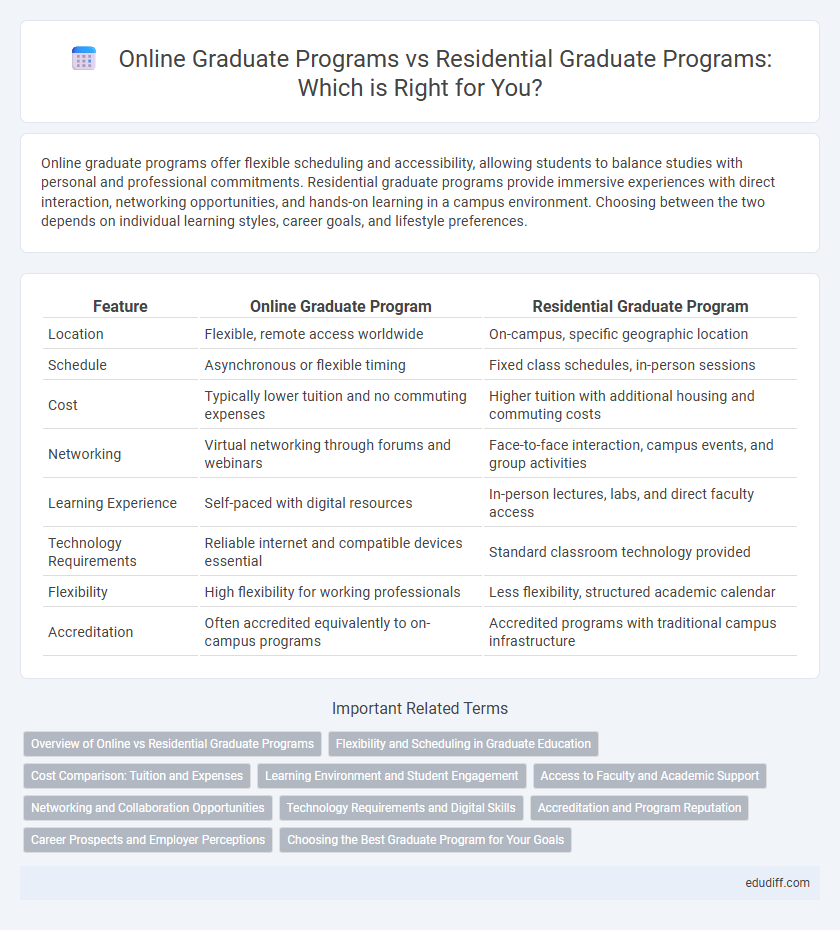Online graduate programs offer flexible scheduling and accessibility, allowing students to balance studies with personal and professional commitments. Residential graduate programs provide immersive experiences with direct interaction, networking opportunities, and hands-on learning in a campus environment. Choosing between the two depends on individual learning styles, career goals, and lifestyle preferences.
Table of Comparison
| Feature | Online Graduate Program | Residential Graduate Program |
|---|---|---|
| Location | Flexible, remote access worldwide | On-campus, specific geographic location |
| Schedule | Asynchronous or flexible timing | Fixed class schedules, in-person sessions |
| Cost | Typically lower tuition and no commuting expenses | Higher tuition with additional housing and commuting costs |
| Networking | Virtual networking through forums and webinars | Face-to-face interaction, campus events, and group activities |
| Learning Experience | Self-paced with digital resources | In-person lectures, labs, and direct faculty access |
| Technology Requirements | Reliable internet and compatible devices essential | Standard classroom technology provided |
| Flexibility | High flexibility for working professionals | Less flexibility, structured academic calendar |
| Accreditation | Often accredited equivalently to on-campus programs | Accredited programs with traditional campus infrastructure |
Overview of Online vs Residential Graduate Programs
Online graduate programs offer flexible schedules, allowing students to balance professional and personal commitments while accessing diverse course materials through digital platforms. Residential graduate programs provide immersive learning experiences with direct interaction, fostering networking opportunities and hands-on collaborations on campus. Both formats maintain rigorous academic standards, but online programs emphasize convenience and technology integration, whereas residential programs prioritize face-to-face engagement and campus resources.
Flexibility and Scheduling in Graduate Education
Online graduate programs offer unparalleled flexibility, allowing students to access coursework and complete assignments on their own schedules, ideal for working professionals and those with family commitments. Residential graduate programs typically follow a fixed schedule with set class times, fostering direct interaction and immediate feedback but requiring presence on campus. Flexibility in online education supports diverse learning paces, whereas residential programs emphasize structured time management and immersive academic experiences.
Cost Comparison: Tuition and Expenses
Online graduate programs typically offer lower tuition rates and eliminate commuting, housing, and campus fees, resulting in significant cost savings compared to residential programs. Residential graduate programs often incur higher expenses due to on-campus housing, meal plans, and relocation costs, increasing the overall financial burden. Evaluating the total cost of attendance, including hidden fees and personal expenses, is crucial for prospective graduate students when choosing between online and residential formats.
Learning Environment and Student Engagement
Online graduate programs offer flexible learning environments that accommodate diverse schedules, utilizing virtual classrooms, interactive forums, and multimedia resources to foster student engagement. Residential graduate programs provide immersive, face-to-face interactions, promoting spontaneous discussions, networking opportunities, and hands-on collaboration that enhance deep learning. Both learning environments impact student engagement differently, with online formats emphasizing accessibility and technology-based interaction, while residential settings prioritize direct social engagement and experiential learning.
Access to Faculty and Academic Support
Online graduate programs provide flexible access to faculty through virtual office hours, discussion boards, and video conferencing, enabling students to receive timely academic support regardless of location. Residential graduate programs offer face-to-face interactions that facilitate immediate feedback, collaborative learning, and more spontaneous engagement with professors. Both delivery modes prioritize academic support, but the nature of faculty access differs, influencing student experience and connectivity.
Networking and Collaboration Opportunities
Online graduate programs offer flexible networking opportunities through virtual discussion forums, webinars, and global peer connections, enabling collaboration beyond geographical barriers. Residential graduate programs provide immersive in-person networking experiences, fostering spontaneous interactions, group projects, and access to on-campus events that strengthen professional relationships. Students in residential settings often benefit from face-to-face mentorship and immediate access to university resources, enhancing collaborative learning.
Technology Requirements and Digital Skills
Online graduate programs require robust internet connectivity, updated software platforms, and proficiency in digital collaboration tools like Zoom, Microsoft Teams, and learning management systems, emphasizing advanced technological skills. Residential graduate programs often rely on traditional in-person instruction with occasional use of digital resources, demanding less consistent engagement with technology but still benefiting from foundational digital literacy. Mastering virtual communication, cybersecurity awareness, and efficient management of digital coursework are critical for success in online graduate education compared to the on-campus experience.
Accreditation and Program Reputation
Accreditation from recognized bodies is crucial for both online graduate programs and residential graduate programs, ensuring academic credibility and quality standards. Online graduate programs accredited by regional or national agencies often offer flexibility without compromising the rigor found in residential programs, which typically have longer-established reputations due to their physical campus presence and direct faculty interaction. Program reputation is frequently influenced by alumni success, faculty expertise, and industry connections, with residential programs traditionally having an edge, although top-tier online programs increasingly match these standards through robust partnerships and comprehensive resources.
Career Prospects and Employer Perceptions
Online graduate programs offer flexible learning schedules and allow students to gain up-to-date skills relevant to rapidly changing industries, boosting career prospects in tech, healthcare, and business sectors. Residential graduate programs foster in-person networking, immersive learning experiences, and direct engagement with faculty, often perceived by employers as providing stronger interpersonal and leadership skills. Employer perceptions increasingly recognize accredited online degrees but often favor residential programs for roles requiring collaboration and hands-on experience.
Choosing the Best Graduate Program for Your Goals
Selecting the best graduate program requires evaluating the flexibility, learning environment, and networking opportunities offered by online and residential formats. Online graduate programs provide convenience and accessibility for working professionals and those with geographic constraints, while residential programs offer immersive campus experiences and direct interaction with peers and faculty. Aligning program structure with personal career goals and learning preferences ensures optimal academic and professional outcomes.
Online Graduate Program vs Residential Graduate Program Infographic

 edudiff.com
edudiff.com